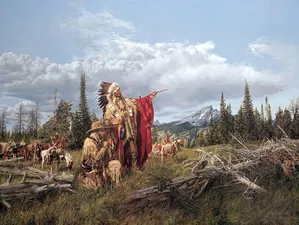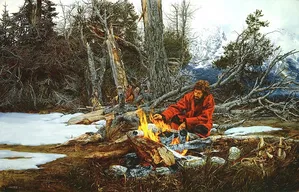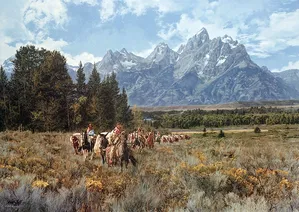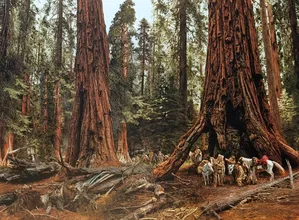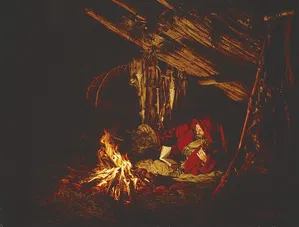Paul Calle Return to Camp Masterworks Giclee On Canvas
Status: In Stock Available | Condition: New | Edition:Limited Edition Giclee On Canvas | Edition Size: Limited Edition of 180 | Dim:45 X 29 | Paul Calle| Item #: GWTCAMP
Price: $ 525.00 USD.. 🚚 This item ships FREE
2/28/2026 $175.00 1st payment
3/30/2026 $175.00 2nd payment
4/29/2026 $175.00 3rd & final payment
payments are automatically deducted from your credit card.
Optional Payment Methods
As an option you may also pay for Paul Calle Return to Camp Masterworks Giclee On Canvas using Paypal or with your Amazon Account(*select items). Please note that all orders must be delivered to a physical address verified by Paypal or Amazon.
Shipping Within The Continental USA
Return to Camp Masterworks Qualifies for Free Shipping
For your peace of mind, every order is shipped fully insured with UPS and requires a signature upon delivery. This ensures that your artwork arrives safely and securely, directly into your hands. Depending on the item, shipments may come from our gallery or from one of our trusted warehouses within the USA.
Before your order is processed and shipped, one of our agents will reach out to you by phone to confirm the details. This extra step ensures everything is accurate, so your artwork arrives smoothly and without any issues. … View our shipping policies
International Shipping
Countries We Ship To:
Request your international delivery cost for items not eligible for PayPal flat rate or free international shipping. Click the link and provide your details to request your quote. We’ll provide your personalized shipping and insurance quote within 24 hours.
Spanish (Español) Solicite el costo de entrega internacional para artículos que no sean elegibles para la tarifa plana de PayPal ni el envío internacional gratuito. Haga clic en el enlace y proporcione sus datos para solicitar su cotización. Le enviaremos su cotización personalizada de envío y seguro en un plazo de 24 horas.
French (Français) Demandez le coût de livraison internationale pour les articles non éligibles au tarif forfaitaire PayPal ou à la livraison internationale gratuite. Cliquez sur le lien et indiquez vos informations pour demander votre devis. Nous vous fournirons un devis personnalisé pour l’expédition et l’assurance sous 24 heures.
German (Deutsch) Fordern Sie die internationalen Lieferkosten für Artikel an, die nicht für den PayPal-Pauschaltarif oder den kostenlosen internationalen Versand berechtigt sind. Klicken Sie auf den Link und geben Sie Ihre Daten ein, um Ihr Angebot anzufordern. Innerhalb von 24 Stunden erhalten Sie Ihr persönliches Angebot für Versand und Versicherung.
Italian (Italiano) Richieda il costo di consegna internazionale per gli articoli non idonei alla tariffa flat di PayPal o alla spedizione internazionale gratuita. Clicchi sul link e inserisca i suoi dati per richiedere il preventivo. Le forniremo un preventivo personalizzato per spedizione e assicurazione entro 24 ore.
Dutch (Nederlands) Vraag de internationale verzendkosten aan voor artikelen die niet in aanmerking komen voor het PayPal-vast tarief of gratis internationale verzending. Klik op de link en geef uw gegevens door om uw offerte aan te vragen. U ontvangt binnen 24 uur een persoonlijke offerte voor verzending en verzekering.
Japanese (日本語) PayPal の定額送料や国際無料配送の対象外となる商品の国際配送料をお見積もりします。リンクをクリックし、必要事項をご入力のうえお見積りをご依頼ください。24時間以内に発送および保険の個別見積りをご案内します。
🇦🇺 🇦🇹 🇩🇰 🇫🇮 🇫🇷 🇩🇪 🇮🇪 🇮🇹 🇯🇵 🇳🇱 🇳🇴 🇪🇸 🇸🇪 🇨🇭 🇬🇧
Promotions For Paul Calle - Return to Camp Masterworks
Price Match
Art Terminologies
Giclée - A computerized reproduction technique in which the image and topography are generated from a digital file and printed by a special ink jet printer, using ink, acrylic or oil paints. Giclée printing offers one of the highest degree of accuracy and richness of color available in any reproduction techniques
Lithography - Printing technique using a planographic process in which prints are pulled on a special press from a flat stone or metal surface that has been chemically sensitized so that ink sticks only to the design areas and is repelled by the non-image areas. Lithography was invented in 1798 in Germany by Alois Senefelder.
Serigraphy (Silk-screen) - A printing technique that makes use of a squeegee to force ink directly onto a piece of paper or canvas through a stencil creating an image on a screen of silk or other fine fabric with an impermeable substance. Serigraphy differs from most other printing in that its color areas are paint films rather than printing ink stains.
Remarque – Additional enhancements by the artist on some or all of the final prints within an edition
Artist's Proof (AP) - Print intended for the artist's personal use. It is common practice to reserve approximately ten percent of an edition as artist's proofs, although this figure can be higher. The artist's proof is sometimes referred to by its French épreuve d'artist (abbreviation E.A.). Artist's proofs can be distinguished by the abbreviation AP or E.A., commonly on the lower left of the work.
“Gallery wrapped” is a way of finishing a canvas artwork so it’s ready to hang without needing an additional frame. The canvas is stretched tightly over thick wooden stretcher bars, and the edges of the canvas are wrapped around the sides and stapled on the back.
Stretched - When a canvas is described as stretched, it means the artwork has been pulled tightly over a wooden frame (called stretcher bars) and secured on the back. This process keeps the canvas flat and smooth, ready to hang on the wall or to be placed inside an outer frame.
Hand Embellished - When an artwork is hand embellished, the artist (or a skilled studio artisan) personally adds paint, texture, or other details by hand on top of the printed or finished piece. This gives each artwork unique highlights and depth, making no two pieces exactly alike — even within the same edition.
… learn more Click here for more Art Terms
Availability
Status: In Stock Available
Gift Cards

Gift Card Purchase
E-Gift Cards from The Collection Shop are the perfect way to gift art enthusiasts. Click below for more details!
Paul Calle bio
Paul Calle was a master of both the oil painting and the pencil drawing. His drawings — often very large — showed incredible control and sensitivity; they had the quality of fine etchings. Few contemporary artists had attained greater mastery of the pencil than Calle, who shared his skills in his book, The Pencil, a record of his odyssey as "an artist with a pencil." It has been translated into French, Chinese and Russian. Calle's oil paintings, finely detailed panoramic landscapes of the majestic West, often took several years to complete. Another book of his art, Paul Calle: An Artist's Journey was awarded the prestigious Benjamin Franklin Award for Fine Arts in 1993. Here was an Artist whose career strongly reflected the dramatic era in which he lived and worked. Paul lived in Connecticut, but when he was chairman of the Department of Interior's 'Artist in the Parks' program, Paul traveled widely throughout the West. According to Paul, "The portrayal of Western Art is not a romantic adventure, but a realistic challenge - a personal commitment to portray America’s past." Calle‘s magnificent art portrayed the human spirit, paying tribute to the trailblazers. Whether it was the first astronauts or those largely forgotten and unsung heroes, the North American trappers of the early 1800's. These were the men who blazed trails through mountains, navigated unnamed rivers, and trapped in lonely streams and meadows. Despite their rough existence, they carried the Bible and Shakespeare with them to read around the campfire at day's end. They lived solitary lives, and most of them died unknown, before the age of 35, with records of their exploits, discoveries and stories unrecorded. The style of Calle celebrated their quiet courage and rugged dignity amid the frontier wilderness. Not only was he able to envision how scenes from their lives might have looked, but he rendered his visions with elaborate detail and historical accuracy. His art filled a void in our visual history. With his pencils and his oils, he captured scenes that preceded film, with results that no camera could ever duplicate. NASA recognized Calle‘s unique ability to interpret history. In the sixties, he was commissioned to document America's early space missions. Millions witnessed those historic moments when man first set foot on the moon. They watched as shadowy black-and-white images of the astronauts bobbed across their televisions in 1969. But with his mind's eye, Calle saw the moment in color. His painting, "The Great Moment" conveys its magnitude, capturing not only the image, but the emotion as well. He chronicled many behind the scenes space launch images and captured for posterity artistic interpretations of the events to give a human touch to the mechanical photos and video. He was the only artist allowed to shadow the Apollo 11 crew on the morning of their launch of this historic flight, resulting in a portfolio the cameras never saw. Calle painted man in relation to his environment, moments when man pauses, alone, to consider his surroundings. "The faces tell the story," he said. Like a good book, the art of Paul Calle draws you in, to experience the moment. "My paintings convey a certain period of history. Collectors tell me that they feel that they could be there; that they could be sitting around the campfire in 'Fireside Companions' or in the scene with 'The Storyteller of the Mountains'. They're buying an emotional feeling. I convey what I see, and it attracts them to my work." His painstaking attention to detail involved hours of research, collecting historic artifacts and retracing the footsteps of his subjects, all before committing the scene to pencil on paper or oil on panel. Still, Calle, a disciplined artist and a perfectionist, was never completely satisfied with his spectacular results.



